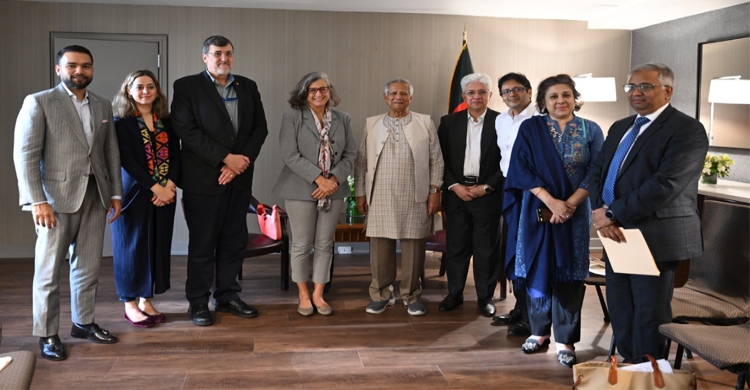CA seeks UN-Habitat's help for low-cost, climate-resilient housing


Chief Adviser Professor Muhammad Yunus today called upon the UN-Habitat to expand its presence in Bangladesh to help develop sustainable and affordable housing solutions for communities frequently impacted by climate-related disasters.
Prof Yunus made the call during a meeting with Under-Secretary-General and Executive Director of UN-Habitat, Anacláudia Rossbach, on the sidelines of the UN General Assembly here in the USA.
The two leaders discussed a wide range of issues, including affordable housing for rapidly urbanising areas, waste management, microfinance-based housing solutions, and the global impact of climate change on vulnerable communities.
Prof Yunus urged UN-Habitat to develop context-specific, multipurpose housing models tailored for communities facing recurring floods, river erosion, and cyclones — disasters increasingly intensified by climate change.
"Floods, cyclones, and river erosion destroy thousands of homes every year. We urgently need sustainable and affordable housing solutions for these people," he said.
He proposed innovative design solutions, such as constructing rooftops that could function as boats during floods. "Design the roof in a way that it can become a boat during a flood," the chief adviser suggested.
Prof Yunus also requested the Nairobi-based agency to explore integrated solutions for housing, sanitation, and waste management in slums, favelas and informal settlements worldwide.
He emphasised the importance of designing homes that are women-friendly: "We must ensure our housing designs meet the needs of women and make daily life more convenient for them."
The discussion also touched on the urgent need for durable housing for more than one million Rohingyas currently sheltered in Bangladesh.
Prof Yunus invited UN-Habitat to participate in next week’s high-level UN conference on the Rohingya crisis in New York.
Additionally, he proposed that the UN-Habitat World Urban Forum launch an annual global design competition focused on climate-resilient and affordable housing for different regions. Executive Director Rossbach welcomed the proposal.
Rossbach confirmed UN-Habitat's interest in attending the upcoming Rohingya conference and responded positively to an invitation from Housing and Industries Adviser Adilur Rahman Khan to visit the Rohingya camps in Bangladesh in the coming months.
She stressed the importance of a robust UN-Habitat presence in Bangladesh, given the country’s frontline position in the global climate crisis.
Rossbach also invited Bangladesh to participate in the upcoming Zero Waste Forum in Istanbul (October 17–19, 2025) and the next UN-Habitat World Urban Forum in Baku, Azerbaijan.
Waste management featured prominently in the discussions.
Prof Yunus, who serves on the UN Secretary-General’s Zero Waste Advisory Board, emphasised the need for sustainable technologies to manage waste in both cities and slums.
Rossbach also highlighted the importance of incremental housing development, improved urban planning, and the integration of microfinance in housing initiatives.
Also present at the meeting were Housing and Industries Adviser Adilur Rahman Khan, Special Envoy to the Chief Adviser Lutfey Siddiqi, and SDG Coordinator Lamiya Morshed.
